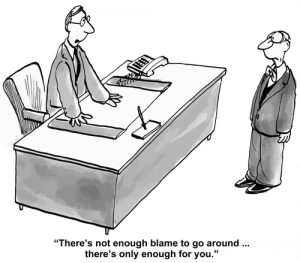Recently I published the second part of a two-part blog series on corporate psychopaths who are basically wolves in sheep’s clothing. Often these wolves are at the top of the corporate food chain and are in senior/executive roles. In the current article, I will discuss corporate scapegoats or sacrificial lambs that sometimes fall victim to these wolves … and more importantly how they can recover after being unjustly let go.
 To be fair and accurate, not all employees who become corporate scapegoats are working for or with a corporate psychopath. Regardless, being scapegoated is a very real occupational hazard that happens rather frequently … even though it’s not discussed openly in polite conversation.
To be fair and accurate, not all employees who become corporate scapegoats are working for or with a corporate psychopath. Regardless, being scapegoated is a very real occupational hazard that happens rather frequently … even though it’s not discussed openly in polite conversation.
Lately, to see a real corporate scapegoat, all you need to do is go online to read or watch the news. In modern politics, certain high-profile staffers are being fired on what seems like a weekly basis. Despite the glaring evidence that most of those highly visible political employees have not even been employed long enough to have done anything wrong, time and time again we witness their very public and humiliating firings.
In much less scrutinized and publicized fora, hard-working employees also experience these unfair dismissals with little to no explanation other than being made to shoulder the errors and unwarranted blame from coworkers and superiors alike.
 So what does a corporate scapegoat look like? How can you tell? Maybe at first, it seems as if you’re being singled out whenever something goes wrong (even if these problems existed before you began working for the organization). Perhaps you are being criticized for an error that is not even part of your work responsibilities/mandate. Or maybe, former positive performance reports, and/or accolades are ‘adjusted’ to make you look like a poor performer. These not so subtle hints that you have become the chosen lamb led to the slaughter is as terrifying as it is perplexing … especially after being called into a meeting with the head office only to be ‘let go’ due to your lack of ‘productive growth’ or some other euphemism. And as you dare to stare your supervisor in the eye he just shrugs, shuffles a few papers with an awkward cough and allows you to take the hit.
So what does a corporate scapegoat look like? How can you tell? Maybe at first, it seems as if you’re being singled out whenever something goes wrong (even if these problems existed before you began working for the organization). Perhaps you are being criticized for an error that is not even part of your work responsibilities/mandate. Or maybe, former positive performance reports, and/or accolades are ‘adjusted’ to make you look like a poor performer. These not so subtle hints that you have become the chosen lamb led to the slaughter is as terrifying as it is perplexing … especially after being called into a meeting with the head office only to be ‘let go’ due to your lack of ‘productive growth’ or some other euphemism. And as you dare to stare your supervisor in the eye he just shrugs, shuffles a few papers with an awkward cough and allows you to take the hit.
It is unfair. It is discouraging. Worst of all, it can be extremely damaging to your financial security and your future employment prospects. So how do you recover?
Follow these four steps to start to get back on track:
1) Get your own legal advice immediately. Refuse to rely on in-house counsel or an outside firm that represents your employer, if offered. Your company’s lawyer is not your lawyer, and you are not their client. Seeking advice early may preserve more of your options. Waiting to see how things play out may reduce your options. Also, be careful about relying too much on your union, if you’re part of one. A union can’t place your interests above the interests of other union members who are ‘equal members’ and also entitled to the union’s support.
2) Your lawyer will guide you through the process of wrongful dismissal (or other options). This will help to repair some of the damage that your reputation has suffered. This process may also provide you with some severance money that will help to sustain you until you find a new job. Try not to waste time proving your innocence (that’s your lawyer’s job); instead, focus on getting back to work.
3) ‘Intersecting’ issues may be at play. If there are other issues at play which may relate to sexual harassment, workplace bullying, or discrimination based on your race, ethnicity, sexual orientation/identity, etc. I’d suggest that you interview a few lawyers or ask around for a recommendation.
4) To put it politely, being made into a scapegoat is traumatic and complicated. You’ll benefit tremendously from some help to get you situated into your next job. Some counselling or therapy will help you restore your self-confidence and process other emotions. Equally important and urgent is some reliable outplacement that will provide you with the strategies and support that you need to line up your next job. Ideally, your former employer will cover the costs of the outplacement/career coaching as part of your severance and wrongful dismissal package.
Note – this blog is no substitute for seeking the advice of an employment lawyer who will analyze your particular situation and guide you toward your best outcome.
Have you ever wished you could get inside the head of a hiring manager? You can. Dr. Helen Ofosu is a Career Coach/Counsellor with a difference. She has worked for organizations to create hiring and screening tools. She’s created countless pre-screening tests, interviews, simulations, and role-plays for organizations of all kinds.
Dr. Helen’s training in Industrial and Organizational (I/O) Psychology means she is a genuine expert in evaluating work-related behaviours. She uses those skills to help hiring managers tell the difference between people who say the right things during interviews and people who actually deliver on the job. In other words, Dr. Helen understands first-hand how job candidates are assessed.
[speaker-mute]
Do you need help navigating the world of work? Contact Dr. Helen today for a free and confidential initial consultation by phone, email, or via direct message on Twitter, Facebook, or LinkedIn.
More than career coaching, it’s career psychology®.
I/O Advisory Services – Building Resilient Careers and Organizations.™
[/speaker-mute]




